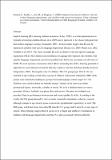Implicit Learning in children with and without language impairments and children with mental retardation: Using a dynamic assessment paradigm.

Type de référence
Date
2010-06-25Langue de la référence
AnglaisEntité(s) de recherche
EMC Laboratory - University of LyonC Laboratory (Etude des Mécanismes Cognitifs) LabEX Cortex
Résumé
Implicit learning (IL), learning without awareness (Reber, 1989), is a robust phenomenon in typically developing children (Evans et al. 2009) and is proposed to be a basic biological trait that enables language learning (Tomasello, 2003). Recent studies suggest that IL may be impaired in children with specific language impairment (Evans et al. 2009; Plante et al. 2002; Tomblin et al. 2007). This study evaluates IL skills in children with non-specific language impairment (NLI). NLI children present deficits in language development, like children with specific language impairment, and also nonverbal skills below the customary cut-off score of 85SD. We used dynamic assessment, which allows measuring the child’s learning potential in opposition to conventional assessment that only captures what the child had already mastered (Grigorenko, 2009). Participants were 45 children. The NLI group (ages 10;3-11;9) was matched in age-reading-verbal IQ to a group of children with mental retardation (MR). Both groups were matched in reading to a group of normal language controls (ages 6;5-7;4). Children were asked to detect the intruder among 3 stimuli of the same type (either geometrical figures, nonwords, syllables or notes). We used a familiarization-test-retest procedure. On test, feedback was given after each answer. On retest no feedback was provided. Gain in performance between test and retest signifies IL skills. According to the results, the NLI group showed IL only on notes (sound discrimination), whereas, controls although younger in age showed gains on nonwords (graphotactic regularities) as well. The RM group, which had lower nonverbal IQ than the NLI group, didn’t show IL on any type of stimuli. These findings suggest that IA seems to be a fragile and ineffective mechanism in children with language impairments and that IA is also associated with nonverbal IQ.Portée nationale / internationale
internationalePublic(s) cible(s)
Chercheursprofessionels du domaine
Nom de la manifestation
Child Language Seminar (CLS)Date(s) de la manifestation
24-25 juin 2010Ville de la manifestation
LondonPays de la manifestation
EnglandPortée de la manifestation
internationaleURL permanente ORFEE
http://hdl.handle.net/20.500.12162/5509Autre(s) URL(s) permanente(s)
http://doi.org/https://doi.org/10.1177/0265659009106703Document(s) associé(s) à la référence
Texte intégral :
Fichier
Accès
Commentaire
Taille
- Tout ORFEE
- Détail référence



